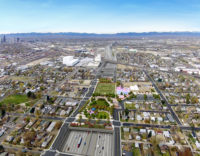Environmental Impact
FHWA Dismisses Colorado's I-70 Civil-Rights Complaint
Will the project unfairly displace Latino residents?

A freeway expansion project in Denver overcomes a federal civil-rights action filed against it.
IMAGE COURTESY OF CDOT
The Federal Highway Administration in late April dismissed a complaint intended to block a $1.2-billion expansion of Interstate 70 through north Denver. Earthjustice, an environmental law firm, filed the complaint on behalf of neighborhood groups opposed to the project.
The complaint alleged that the Colorado Dept. of Transportation’s plan to reconstruct a 10-mile stretch of I-70, remove a 50-year-old viaduct and widen the freeway would discriminate against low-income neighborhoods and displace the mostly Latino residents near the highway.
Opponents have asked CDOT to reconsider moving the freeway farther north, along the existing route of I-270 and I-76. But the agency long ago rejected that plan, citing its estimated $3-billion price tag. The FHWA report said that, while the I-70 plan is not without its flaws, “there is insufficient evidence the project will create adverse, disparate [area] impacts” and that it is probably preferable to other options.
CDOT officials say they will move forward this summer with selection of a private concessionaire. “This is the biggest project CDOT has ever undertaken,” says Rebecca White, Central 70 spokeswoman. “We’ve been at it for 15 years, and we’ve done everything we were required to do.”
Still, project opponents vow to fight on. A Sierra Club air-quality-standard lawsuit is pending in federal court, and attorney Bob Yuhnke says another lawsuit is planned. “We’ve asked CDOT to investigate the role that the highway has played in exacerbating health impacts for people living nearby, and it has refused to do that, so they’ll need to explain that to a judge,” he says.
“I don’t think anyone can claim that increasing the capacity [of the freeway] will help the health situation,” says Adrian Brown, president of Citizens for a Greater Denver. “It shows a myopic view at odds with community health.”


